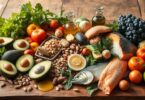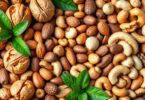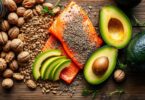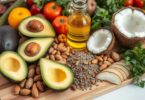Fat-Rich Foods: Essential Dietary Sources
In today’s world, many think all fats are bad. But, some fats are key for our health and bring many benefits. Are you ready to learn about the power of fat-rich foods and how they boost your nutrition?
Did you know the right fats can help your heart, brain, and even with weight? Curious? Let’s explore the amazing world of fat-rich foods and their role in a healthy diet.
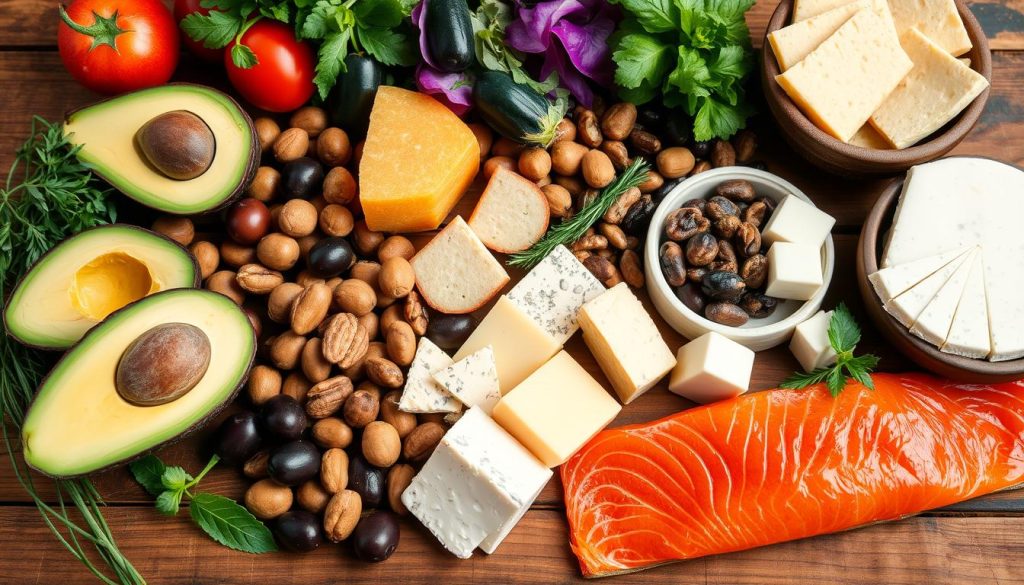
Key Takeaways
- Dietary fats are essential for various bodily functions and overall health.
- Healthy fats, such as those found in avocados, nuts, and olive oil, offer numerous benefits.
- Incorporating a variety of fat-rich foods into your diet can enhance nutrient absorption and support overall well-being.
- Understanding the difference between healthy and unhealthy fats is crucial for making informed dietary choices.
- Vegetarians and vegans can also enjoy the benefits of fat-rich foods through plant-based sources.
Introduction to Fat-Rich Foods
Fats are key to a balanced diet, giving us important nutrients and energy. It’s vital to know the difference between good and bad fats for our health.
Understanding the Importance of Dietary Fats
Dietary fats are rich in essential fatty acids and are crucial for our bodies. They help us absorb vitamins, support hormone production, and give energy to our cells. Choosing the right fats can greatly improve our health.
Distinguishing Between Healthy and Unhealthy Fats
Not all fats are the same. Healthy fats, like monounsaturated and polyunsaturated fats, are good for us. They’re found in avocados, nuts, seeds, and fatty fish. In contrast, unhealthy fats, such as trans fats and saturated fats, can harm our health. Knowing the difference helps us make better food choices.
Adding the right amount of healthy fats to our diet offers many benefits. It can improve heart health, brain function, and overall well-being. Exploring fat-rich foods helps us find tasty and healthy ways to nourish our bodies.
Avocados: Nature’s Creamy Superfood
In the world of healthy fat foods, avocados stand out. They are a nutrient-dense fruit that has become a key part of our diets. Known for their creamy texture and healthy fats, avocados bring many health benefits. This makes them a true superfood.
Avocados are full of monounsaturated fats. These fats help keep cholesterol levels healthy and support heart health. They also have a lot of fiber. This fiber helps you feel full and can help with weight management.
| Nutrient | Amount in 1 Avocado |
|---|---|
| Calories | 320 |
| Total Fat | 29g |
| Monounsaturated Fat | 20g |
| Fiber | 13g |
| Vitamin K | 26% of the RDI |
| Folate | 20% of the RDI |
Avocados are not just good for you; they also help your body absorb fat-soluble vitamins. This makes them a great choice for a healthy diet. You can enjoy them on their own, in smoothies, or in savory dishes. They are a tasty way to nourish your body and satisfy your taste buds.
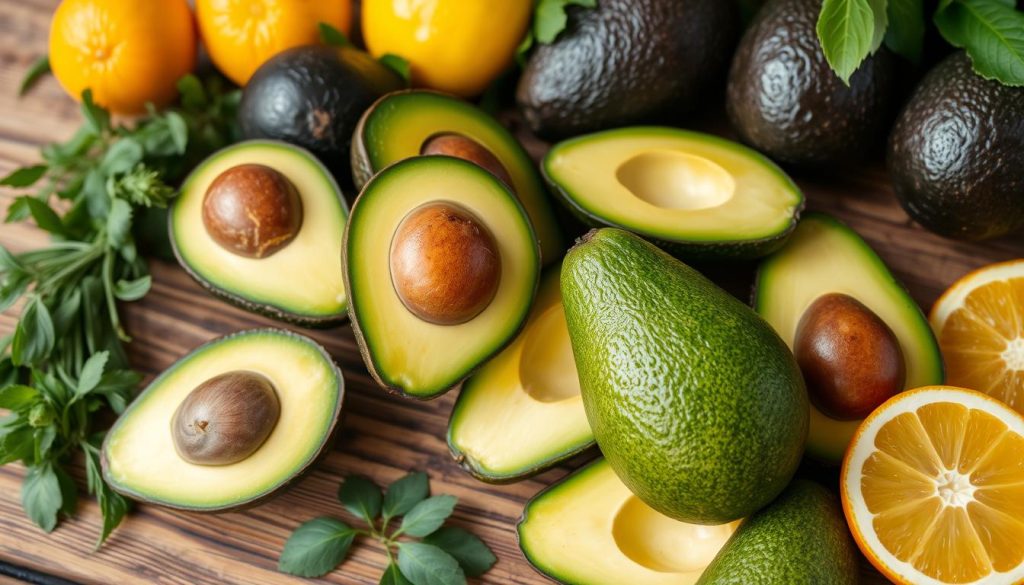
“Avocados are a versatile, nutrient-dense fruit that can support overall health and well-being.”
Nuts and Seeds: Nutrient-Dense Powerhouses
Nuts and seeds are often overlooked, but they are packed with essential nutrients. They are great for a balanced diet rich in fat. These nuts and seeds support heart health and boost brain function. They should be a key part of any healthy diet.
Benefits of Incorporating Nuts and Seeds into Your Diet
Nuts and seeds are full of healthy fats, protein, fiber, and vitamins. They are true diet essentials. Here are a few reasons to add them to your diet:
- Heart Health: The healthy fats and antioxidants in nuts and seeds support heart health and lower heart disease risk.
- Brain Function: Walnuts and chia seeds, rich in omega-3s, are key for brain health and cognitive function.
- Digestive Support: The fiber in nuts and seeds aids digestion and promotes a healthy gut.
- Weight Management: Despite their fat content, nuts and seeds can aid in weight loss and maintenance by keeping you full.
| Nut or Seed | Key Nutrients | Health Benefits |
|---|---|---|
| Almonds | Vitamin E, magnesium, fiber | Supports heart health, skin health, and blood sugar regulation |
| Flaxseeds | Omega-3 fatty acids, lignans, fiber | Promotes digestive health, reduces inflammation, and may prevent certain cancers |
| Pumpkin Seeds | Zinc, magnesium, antioxidants | Boosts immune function, supports prostate health, and may improve sleep quality |
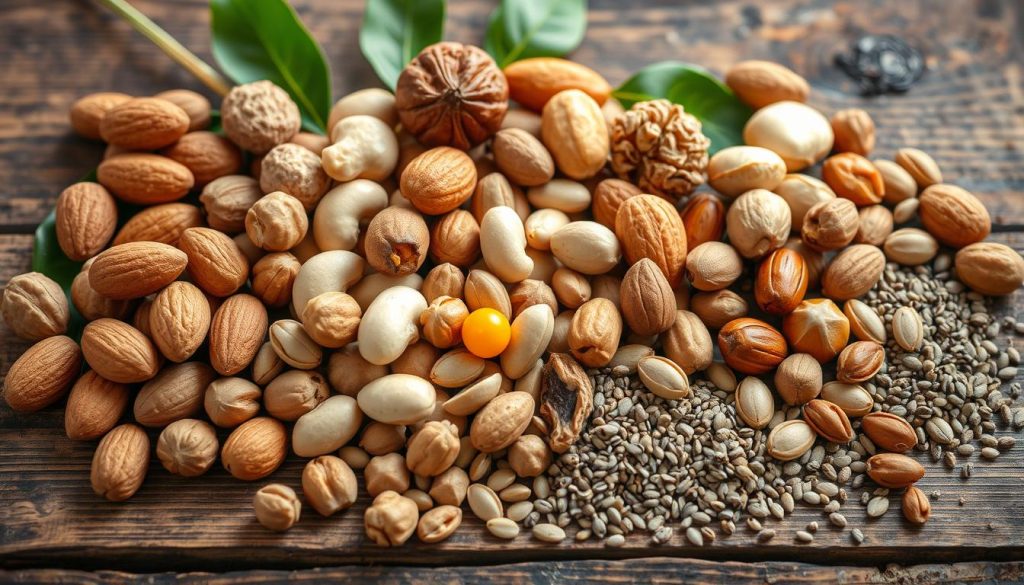
Adding a variety of nuts and seeds to your diet is easy. Use them as snacks, on meals, or in baking. These versatile ingredients can make your fat-rich diet better and improve your overall health.
Olive Oil: The Mediterranean Miracle
Olive oil is a key part of the Mediterranean diet. It’s not just for flavor; it’s packed with health benefits. Adding olive oil to your meals can make a big difference in your health.
Exploring the Health Benefits of Olive Oil
Olive oil is full of monounsaturated fats. These fats are good for your heart by keeping cholesterol levels healthy. It also has antioxidants that fight inflammation, which may lower the risk of chronic diseases.
Olive oil is also great for your brain. The healthy fats and antioxidants in it can improve brain function and help with aging. This makes olive oil a superfood from the Mediterranean.
Adding olive oil to your meals is easy. You can drizzle it on salads, use it for sautéing, or in baked goods. It adds flavor and nutrition to many dishes.
| Nutrient | Amount per 1 Tablespoon of Olive Oil |
|---|---|
| Calories | 119 |
| Total Fat | 13.5g |
| Saturated Fat | 1.9g |
| Monounsaturated Fat | 9.8g |
| Polyunsaturated Fat | 1.4g |
| Vitamin E | 1.9mg |
| Vitamin K | 8.1mcg |
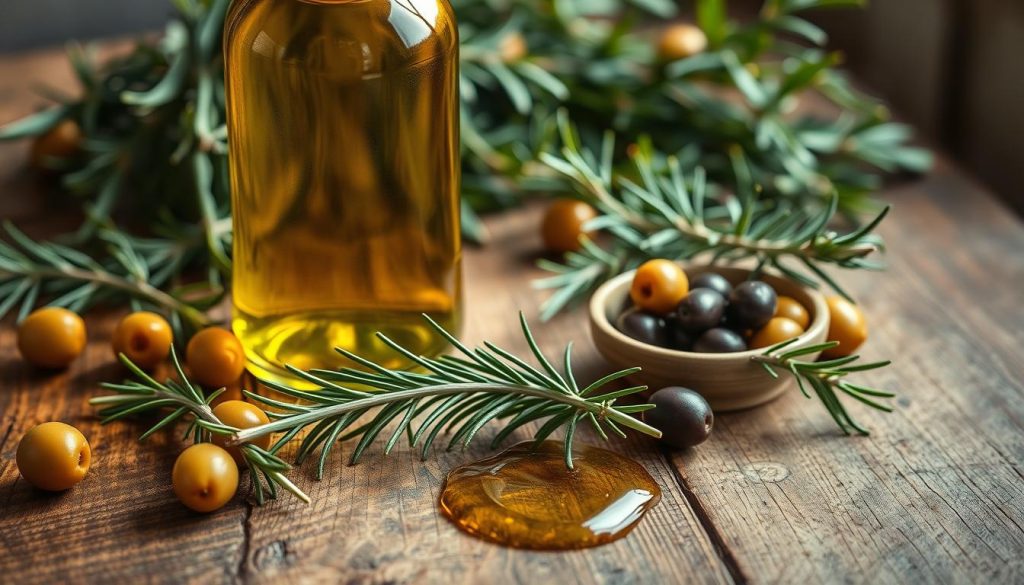
Using olive oil in your diet can bring many health benefits. It’s good for your heart, fights inflammation, and adds nutrition to your meals. This Mediterranean treasure is both tasty and healthy.
Fatty Fish: Omega-3 Superstars
Fatty fish are true omega-3 superstars when it comes to fat-rich foods. They are key to a healthy, fat-rich diet. Salmon, mackerel, and sardines are packed with omega-3 fatty acids. These fish offer many health benefits, making them essential for a diet essentials.
Omega-3 fatty acids in fatty fish are vital for heart health. They help keep blood pressure in check, reduce inflammation, and lower heart disease risk. Omega-3s also boost brain function, improve thinking, and enhance mood.
| Fatty Fish | Omega-3 Content (per serving) |
|---|---|
| Salmon | 1.1-2.2 grams |
| Mackerel | 3.0-4.5 grams |
| Sardines | 1.2-2.0 grams |
Fatty fish are not just high in omega-3s. They also have lots of protein, vitamins, and minerals. Adding these nutrient dense foods to your healthy diet can greatly benefit your health.

Grilled, baked, or canned, fatty fish are easy to include in your meals. They are a tasty way to get the benefits of omega-3 rich foods. Make fatty fish a key part of your fat-rich diet for better health and energy.
Nut Butters: Portable and Protein-Packed
Nut butters are a great choice for healthy fats. They come in many flavors like peanut butter and almond butter. These spreads are full of protein and important vitamins and minerals.
Choosing the Right Nut Butter for Your Needs
There are many nut butters to choose from. Here are some tips to pick the right one:
- Protein Content: For more protein, go for peanut or almond butter.
- Nutrient Density: Try cashew or walnut butter for extra vitamins and minerals.
- Dietary Restrictions: Pick a nut butter that fits your diet, like peanut-free or low-sugar.
| Nut Butter | Protein (g/tbsp) | Healthy Fats (g/tbsp) | Key Nutrients |
|---|---|---|---|
| Peanut Butter | 4 | 8 | Vitamin E, Magnesium, Potassium |
| Almond Butter | 3 | 9 | Vitamin E, Calcium, Fiber |
| Cashew Butter | 2 | 8 | Copper, Magnesium, Phosphorus |
| Walnut Butter | 2 | 9 | Omega-3s, Antioxidants, Fiber |
Exploring nut butters can help you find the best one for your diet. They offer many health benefits.
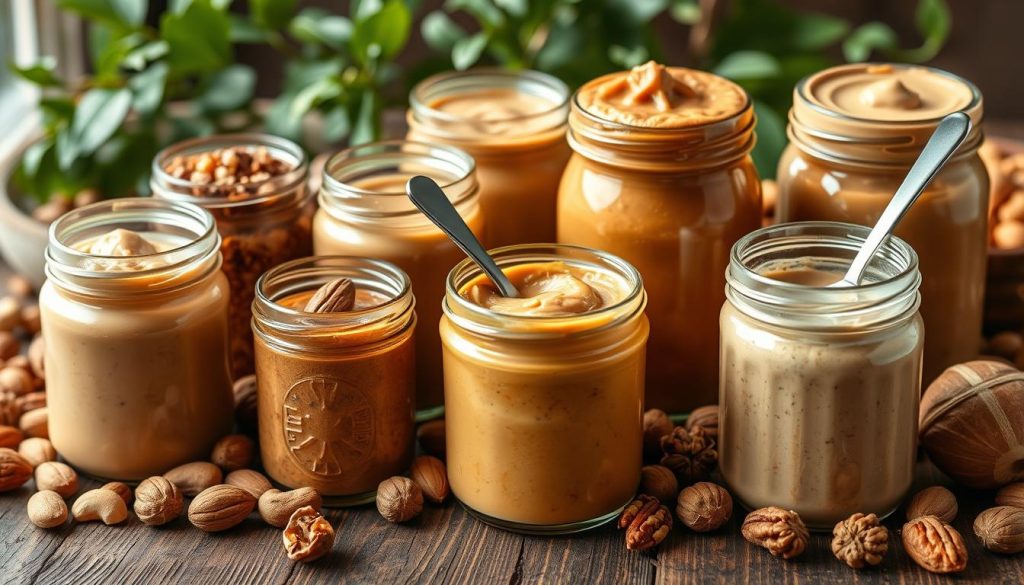
Fat-Rich Foods for Vegetarians and Vegans
Vegetarians and vegans need the right fats for health. Some nutrients, like omega-3s and taurine, are key but harder to find in plants.
Avocados are a must for vegetarians. They’re full of healthy monounsaturated fats that are good for the heart and keep you full. Nuts and seeds, like walnuts, flaxseeds, and chia seeds, are also great. They offer vegan omega 3 sources that plant-based diets often lack.
For vegetarians and vegans, iron is also crucial. While leafy greens, legumes, and fortified foods help, is taurine essential for energy and oxygen transport? Luckily, nutritional yeast and good sources of taurine, like seaweed and certain algae, can help meet this need.
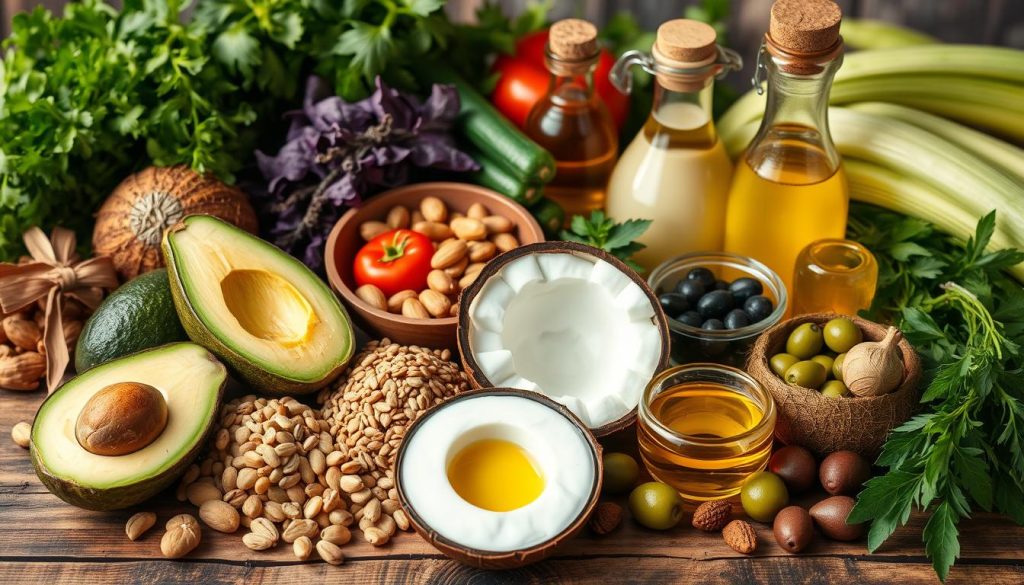
By eating a variety of fat-rich foods, vegetarians and vegans can meet their dietary needs. This supports their health and well-being.
Incorporating Fat-Rich Foods into Your Diet
Adding healthy fats to your diet can change your health for the better. These nutrient dense foods are key for a good diet. They help you burn healthy fats and keep your eating balanced.
Start by eating a variety of fat-rich foods every day. Add avocado to your breakfast, snack on nuts or seeds, or use olive oil on your salad. This way, you get all the essential vitamins and healthy fats your body needs.
Balancing Macronutrients
It’s crucial to balance your macronutrients when eating healthy foods. Make sure you’re not eating too much of any one thing. This balance helps keep you healthy and avoids any nutrient imbalances.
Portion Control and Preparation
- Watch your portion sizes with fat-rich foods. They’re nutritious but also high in calories, so eat them in moderation.
- Try different cooking methods like roasting, grilling, or sautéing. It brings out the best in your healthy fats burn foods.
By eating a variety of fat-rich foods and keeping your macronutrients balanced, you’ll have a healthy diet. This diet supports your health and well-being.
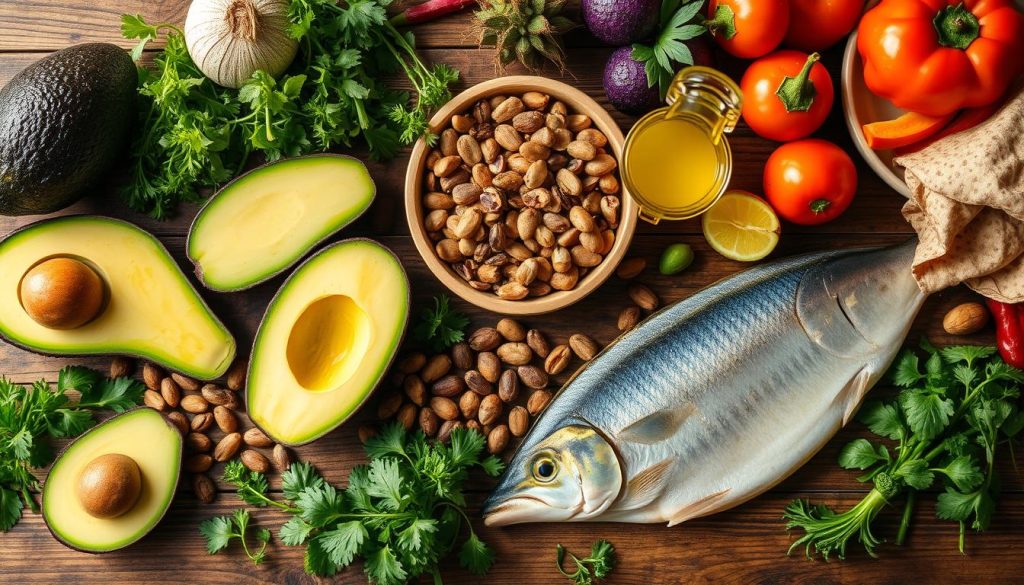
“Healthy fats are the foundation of a balanced, nutrient-dense diet. Embrace them with mindfulness and enjoy the benefits they offer.”
Conclusion
Exploring high-fat diets and lipid-dense cuisine shows us the benefits of fatty indulgences and creamy delights. These can make our diets more balanced and healthy. For example, olive oil-infused delicacies are good for our hearts. Meanwhile, omega-3-rich fatty fish can boost our brain health.
We’ve learned to tell healthy fats from unhealthy ones. This means enjoying buttery treats and nut-based delights in moderation. We’ve also seen how avocados, nuts and seeds, and other fat-rich foods can add variety to our meals.
Keep enjoying the lipid-dense cuisine and high-fat diets that make your meals special. Savor the rich textures and decadent flavors they offer. Let these creamy delights and fatty indulgences enhance your cooking and keep you healthy.
FAQ
What are the benefits of incorporating fat-rich foods into my diet?
Dietary fats are key for energy, hormone balance, and nutrient absorption. Healthy fats in avocados, nuts, seeds, and fatty fish support heart health and weight management. They also provide essential vitamins and minerals.
How can I distinguish between healthy and unhealthy fats?
Healthy fats, like monounsaturated and polyunsaturated fats, are good for health. You can find them in avocados, olive oil, and fatty fish. On the other hand, limit unhealthy fats like trans fats and saturated fats to avoid health problems.
What are the best sources of omega-3 fatty acids?
Fatty fish, such as salmon, mackerel, and sardines, are rich in omega-3s. For vegetarians and vegans, walnuts, chia seeds, and flaxseeds are good sources.
How can I incorporate more avocados into my diet?
Enjoy avocados on toast, in salads, or as a dip. They add creaminess and healthy fats to smoothies, dressings, and even desserts.
What are the nutritional benefits of nuts and seeds?
Nuts and seeds are packed with healthy fats, protein, fiber, and vitamins and minerals. They support heart health, cognitive function, and overall wellness.
How can I use olive oil to enhance the flavor and nutrition of my meals?
Use olive oil for sautéing, roasting, or as a finishing touch. It’s great for dressings, marinades, and dips too.
What are the best ways to incorporate fatty fish into my diet?
Bake, grill, or use fatty fish like salmon in dishes like fish tacos or poke bowls. Canned tuna or sardines are also good for omega-3s.
How can vegetarians and vegans ensure they are getting enough healthy fats in their diet?
Vegetarians and vegans can get healthy fats from avocados, nuts, seeds, nut butters, and plant-based oils. Include a variety to meet fatty acid needs.
What are some tips for balancing fat intake with other macronutrients?
When adding more fat-rich foods, balance with carbs and protein. Aim for a balanced diet that meets your needs and goals.


